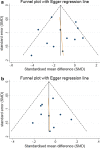Long-term effects (> 24 months) of multiple lifestyle intervention on major cardiovascular risk factors among high-risk subjects: a meta-analysis
- PMID: 33858345
- PMCID: PMC8048075
- DOI: 10.1186/s12872-021-01989-5
Long-term effects (> 24 months) of multiple lifestyle intervention on major cardiovascular risk factors among high-risk subjects: a meta-analysis
Abstract
Background: The evidence of the long-term effects of multiple lifestyle intervention on cardiovascular risk is uncertain. We aimed to summarize the evidence from randomized clinical trials examining the efficacy of lifestyle intervention on major cardiovascular risk factors in subjects at high cardiovascular risk.
Methods: Eligible trials investigated the impact of lifestyle intervention versus usual care with minimum 24 months follow-up, reporting more than one major cardiovascular risk factor. A literature search updated April 15, 2020 identified 12 eligible studies. The results from individual trials were combined, using fixed and random effect models, using the standardized mean difference (SMD) to estimate effect sizes. Small-study effect was evaluated, and heterogeneity between studies examined, by subgroup and meta-regression analyses, considering patient- and study-level variables.
Results: Small-study effect was not identified. Lifestyle intervention reduced systolic blood pressure modestly with an estimated SMD of - 0.13, 95% confidence interval (CI): - 0.21 to - 0.04, with moderate heterogeneity (I2 = 59%), corresponding to a mean difference of approximately 2 mmHg (MD = - 1.86, 95% CI - 3.14 to - 0.57, p = 0.0046). This effect disappeared in the subgroup of trials judged at low risk of bias (SMD = 0.02, 95% CI - 0.08 to 0.11). For the outcome total cholesterol SMD was - 0.06, 95% CI - 0.13 to 0.00, with no heterogeneity (I2 = 0%), indicating no effect of the intervention.
Conclusion: Lifestyle intervention resulted in only a modest effect on systolic blood pressure and no effect on total cholesterol after 24 months. Further lifestyle trials should consider the challenge of maintaining larger long-term benefits to ensure impact on cardiovascular outcomes.
Keywords: Cardiovascular risk; Hypercholesterolemia; Hypertension; Lifestyle intervention; Primary prevention.
Conflict of interest statement
The authors declare that they have no competing interests.
Figures



Similar articles
-
Effects on physical activity, physical fitness and well-being in a 36-months randomized controlled study, comparing a multimodal hospital-based intervention programme for primary cardiovascular prevention with usual care.BMC Cardiovasc Disord. 2024 Apr 25;24(1):225. doi: 10.1186/s12872-024-03892-1. BMC Cardiovasc Disord. 2024. PMID: 38664620 Free PMC article. Clinical Trial.
-
Workplace interventions for increasing standing or walking for decreasing musculoskeletal symptoms in sedentary workers.Cochrane Database Syst Rev. 2019 Nov 17;2019(11):CD012487. doi: 10.1002/14651858.CD012487.pub2. Cochrane Database Syst Rev. 2019. PMID: 31742666 Free PMC article.
-
Effect of Lifestyle Intervention on Cardiometabolic Risk Factors in Overweight and Obese Women with Polycystic Ovary Syndrome: A Systematic Review and Meta-Analysis.Metab Syndr Relat Disord. 2019 Dec;17(10):473-485. doi: 10.1089/met.2019.0049. Epub 2019 Sep 12. Metab Syndr Relat Disord. 2019. PMID: 31513475
-
Aspirin has potential benefits for primary prevention of cardiovascular outcomes in diabetes: updated literature-based and individual participant data meta-analyses of randomized controlled trials.Cardiovasc Diabetol. 2019 Jun 3;18(1):70. doi: 10.1186/s12933-019-0875-4. Cardiovasc Diabetol. 2019. PMID: 31159806 Free PMC article.
-
Psychosocial interventions for preventing and treating depression in dialysis patients.Cochrane Database Syst Rev. 2019 Dec 2;12(12):CD004542. doi: 10.1002/14651858.CD004542.pub3. Cochrane Database Syst Rev. 2019. PMID: 31789430 Free PMC article.
Cited by
-
Lifestyle interventions for cardiometabolic health.Nat Med. 2024 Dec;30(12):3455-3467. doi: 10.1038/s41591-024-03373-0. Epub 2024 Nov 27. Nat Med. 2024. PMID: 39604492 Review.
-
Lifestyle-Related Risk Factors and Primary Prevention Strategies for Cardiovascular Diseases in a Middle-Income Country: A Scoping Review and Implication for Future Research.J Prev (2022). 2024 Aug;45(4):579-609. doi: 10.1007/s10935-024-00782-2. Epub 2024 Jun 5. J Prev (2022). 2024. PMID: 38839738 Free PMC article.
-
Effects on physical activity, physical fitness and well-being in a 36-months randomized controlled study, comparing a multimodal hospital-based intervention programme for primary cardiovascular prevention with usual care.BMC Cardiovasc Disord. 2024 Apr 25;24(1):225. doi: 10.1186/s12872-024-03892-1. BMC Cardiovasc Disord. 2024. PMID: 38664620 Free PMC article. Clinical Trial.
-
Selective prevention of cardiovascular disease using integrated lifestyle intervention in primary care: protocol of the Healthy Heart stepped-wedge trial.BMJ Open. 2021 Jul 9;11(7):e043829. doi: 10.1136/bmjopen-2020-043829. BMJ Open. 2021. PMID: 34244248 Free PMC article. Clinical Trial.
-
Cardiovascular disease risk communication and prevention: a meta-analysis.Eur Heart J. 2024 Mar 27;45(12):998-1013. doi: 10.1093/eurheartj/ehae002. Eur Heart J. 2024. PMID: 38243824 Free PMC article.
References
Publication types
MeSH terms
LinkOut - more resources
Full Text Sources
Other Literature Sources
Medical
Miscellaneous

